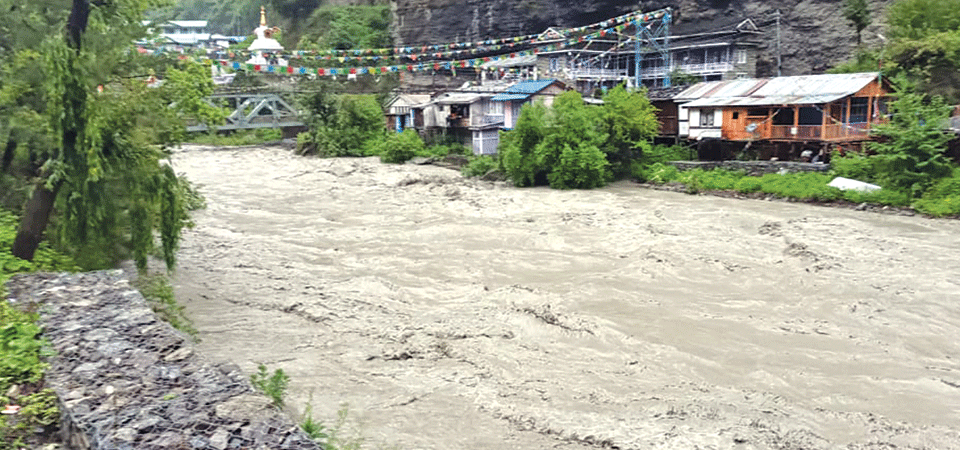Monsoon unleashes floods, Manang worst hit

By A Staff Reporter
Kathmandu, June 16: As the monsoon activated further from Tuesday, major rivers and its streams have swollen, causing floods and inundations in many regions.
According to Meteorological Forecasting Division (MFD) update made at 1:00 pm, the regular monsoon phenomena was further activated due the low pressures area developed in Jharkhand, India, and the lower pressure line of the monsoon itself. According to Manju Basi, meteorologist at the Division, these two separate systems developed in the last 24 hours have been causing continuous rains in many parts of the country.
"There is a possibility of light to moderate rain in many parts of Nepal during the day and night and heavy rain in some parts of Gandaki, Lumbini and Bagmati Provinces and very heavy rain in a few places in the coming 24 hours," Basi said.
Following continuous rains, risk of floods, landslides and inundations has increased across the country.
In this context, at 7:00 am on Tuesday, the Division has issued a flood forecast bulletin on the risk of floods from Tuesday to Thursday.
According to the bulletin, the flow of the Kaligandaki, Tinau, Paschimrapti, Babai, Bheri and its tributaries, including Gandaki, Lumbini, Karnali, Chure and some small rivers flowing through the Terai is likely to increase in the next three days.
The Division has requested the people living in the coastal areas and low-lying areas to be on high alert till Wednesday morning.
Water level in the Narayani River at Devghat, in Chitwan district has crossed the danger level and has been increasing further, according to the update at 4:30 pm. The water level is at 8.144 mm. Also, the water level at the Badigad, Rudrabeni in Gulmi reached above the warning level and is rising further.
However, Manang district was worst hit by the floods on Tuesday. Over 100 houses were displaced because of floods in the Himalayan district.
Flooding caused by incessant rainfall has inundated 60 houses of Chamebazaar and 48 of Taalgaun in Naso Rural Municipality of the district.
Taalgaun, which in Naso Rural Municipality-1, got inundated due to the continuous rainfall from Sunday.
The swollen Marsyangdi river caused inundation in Chame Bazaar.
According to Chief District Officer Bishnu Lamichhane, 300 affected people were shifted to the newly constructed building of District Jail.
Minrashi Gurung of Talgaun said that 10 houses had already been submerged in flood water near the Marsyangdi River. Similarly, other houses around the area are also in danger of flooding. Gurung said that the locals had already left their houses in search of a safer place.
Taalgaun has around 60 households. The locals have been calling for help so that they can be rescued before any damage is done.
Although the locals have been complaining that they were unable to contact the police and local administration owing to the bad weather, Chief District Officer Lamichhane said that police were already deployed in Taalgaun to rescue the locals.
Meanwhile, a landslide triggered by heavy rains has affected people's lives in Syangja and has increased the risk there. Eleven households have been displaced by the floods in the district.
A house has been displaced due to landslide in Arjun Chaupari village and rural roads have been blocked in some places. Dozers have been used to clear the debris.
Similarly, Sanphe-Martadi highway has been blocked in Bajura due to incessant rains for the past three days.
According to the District Administration Office, Bajura, the road leading to Martadi through Bajurgad River was blocked due to landslides.
Chief District Officer Gopal Kumar Adhikari said that the road division Sanphe Bagar was informed to resume work on the Barjugad, Tampri Sera and Balde Amkot roads on the Sanphe Martadi Highway at the earliest.
Likewise, an alert message has been issued to avoid floods as there has been heavy rain for six hours in Bharatpur, Rampur and other areas in Chitwan.
(With inputs from Arjun Kafle, Syangja, Belina from Lamjung and Sher B. Sharki, Bajura.)
Recent News

Do not make expressions casting dout on election: EC
14 Apr, 2022
CM Bhatta says may New Year 2079 BS inspire positive thinking
14 Apr, 2022
Three new cases, 44 recoveries in 24 hours
14 Apr, 2022
689 climbers of 84 teams so far acquire permits for climbing various peaks this spring season
14 Apr, 2022
How the rising cost of living crisis is impacting Nepal
14 Apr, 2022
US military confirms an interstellar meteor collided with Earth
14 Apr, 2022
Valneva Covid vaccine approved for use in UK
14 Apr, 2022
Chair Prachanda highlights need of unity among Maoist, Communist forces
14 Apr, 2022
Ranbir Kapoor and Alia Bhatt: Bollywood toasts star couple on wedding
14 Apr, 2022
President Bhandari confers decorations (Photo Feature)
14 Apr, 2022










